
Cooks in today's hurried world often find themselves without a key ingredient, and they are tempted to find substitutions. Some substitutions work. Corn syrup can fill in for honey, for example. Each is sweet with a similar, syrupy consistency. Lemon juice could be substituted for vinegar. Each has a sour, acidic flavor. Some substitutions, like baking powder for corn starch, ought never to be made no matter how desperate the situation.
Baking Powder Leavens
Baking powder serves the cook as a leavening agent. Through a chemical reaction, it produces carbon dioxide gas and makes dough and batter rise to produce light, fluffy pancakes or biscuits. The water and heat activate the baking powder, and a cook watching pancakes on the griddle will see bubbles form in the batter as the reaction takes place and the cooking pancake rises.
Corn Starch Thickens
As a thickener, pure corn starch is hard to beat. Thanks to its profound blandness, it has no effect on the flavor of a gravy or pudding. With a little practice, a cook can control the amount of thickening with precision as she slowly pours a slurry of corn starch and water into a boiling liquid. Sauces thickened with corn starch are translucent. Sweet and sour sauce is a good example of a sauce thickened with corn starch.
Corn Starch Substitutes
Perhaps the most common and readily available substitute for corn starch in a home kitchen is regular white flour. Flour will see a cook through any thickening emergency. The best one-for-one substitute for corn starch as a thickener for sauces, gravies and puddings is arrowroot. If the recipe calls for 2 tablespoons of cornstarch, 2 tablespoons of arrowroot will do the job. More exotic substitutions would be tapioca and sahlab, which is made from orchid tubers.
Baking Powder Experiment
Baking powder does contain corn starch, and it will thicken a boiling liquid. Curious cooks can conduct an experiment to see the chemical reaction and the thickening happen. Pour 1/4 cup of water into a pan and bring it to a boil. Add a couple spoonfuls of baking powder. The mixture gets foamy and thickens. While the bubbles may be stirred out of the mixture, the flavors will remain. The baking powder's chemical reaction gives the paste a salty, bitter and unpleasant taste.
Related Articles

What Is Ratio for Cornstarch & Water to ...
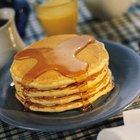
How to Make Pancakes Like a Pancake ...

How Do I Thicken Curry?

Adding Corn Starch to a Pot Roast
Can You Substitute Cornstarch for Flour?
Pot Sticker Dipping Sauce Recipe

How to Make French Sauce With Roux of ...
What Can I Substitute for Cornstarch?
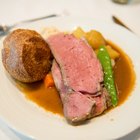
Bisto Ingredients
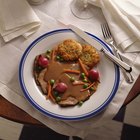
Can You Substitute Cream of Mushroom ...
Alternatives to Xanthan Gum for Binding
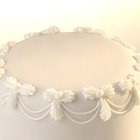
How to Make a White Decorator Icing

How to Cook Moose Meat
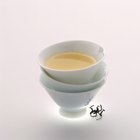
Substitute for Vanilla Custard Powder

How to Make Corn Soup

What to Use as a Thickening Agent for ...
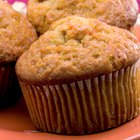
Substitute for Manioc Starch
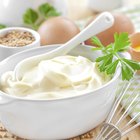
How to Replace Eggs With Mayonnaise

How to Roast Pork on a Weber Grill

How to Make a Boneless Chicken Casserole
References
Writer Bio
Michael Holzmeister has worked in professional kitchens for more than a decade. He graduated from Western State College in Colorado where he majored in English. His writing has been published in the "Denver Post," "Gunnison Country Times," "Lamar Daily News," "Mountain Gazette" magazine and in the book "When in Doubt, Go Higher."
Photo Credits
Ryan McVay/Photodisc/Getty Images